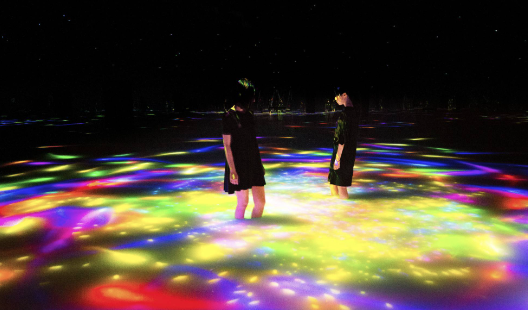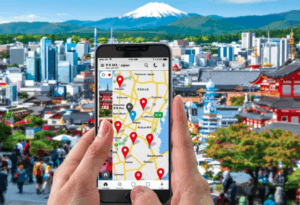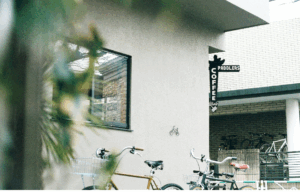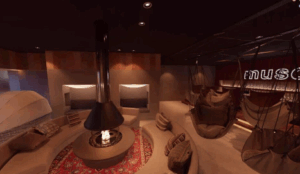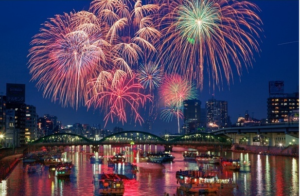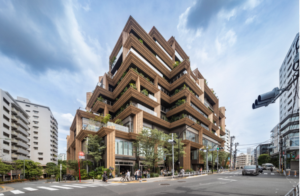When the weather is less than ideal, don’t fret—there are plenty of things to do on a rainy day in Tokyo. Start by checking out some of these excellent indoor activities below, or use the gloomy weather as an excuse to finally sign up for some of the best classes Tokyo has to offer. During a quick storm, you can always find refuge inside one of Azabudai Hills’ cozy cafes and shops.
teamLab Planets
teamLab Planets, which opened in Tokyo in 2018, is a museum designed for the new generation, seamlessly blending digital art with the beauty of nature. Visitors explore the space barefoot, creating an immersive experience. Additionally, within the ‘Reversible Rotation-Non-Objective Space’ installation, you can enjoy vegan ramen. The ramen noodles are a collaboration between teamLab PLANETS and ‘Vegan Ramen UZU’ from Kyoto, a restaurant listed in one of Europe’s most famous food guidebooks. All of these elements contribute to making teamLab Planets one of the best experiences you can have on a rainy day.
Address: 6 Chome-1-16 Toyosu, Koto, Tokyo
Immersive Fort Tokyo
Immersive Fort Tokyo, the world’s first immersive theme park, draws inspiration from London’s interactive theater shows that gained popularity in the 2000s. The park boasts a European-style interior, featuring 12 attractions, along with six stores and restaurants. Here, you can actively participate in the stories and narratives that are hidden in the park. If you are an anime enthusiast, you will particularly enjoy the ‘Tokyo Revengers’-themed escape room. This is just a glimpse of the experiences awaiting you. Ensure to secure your tickets in advance for an unforgettable visit.
Address: 1-3-15 Aomi, Koto, Tokyo
The National Museum of Emerging Science and Innovation
The National Museum of Emerging Science and Innovation, also known as Miraikan, is located in Odaiba. It’s a museum that offers a firsthand experience of Japan’s cutting-edge technology, focusing on areas like space and science. A highly recommended attraction is the planetarium at Dome Theater GAIA. The breathtaking sight of the starry sky projected in 3D on the dome-shaped screen is truly spectacular!
Adress: 2-3-6 Aomi, Koto, Tokyo
National Museum of Nature and Science
The National Museum of Nature and Science is located in Ueno. Exhibits related to nature, biology, and chemical technology are held in two buildings, the Japan Pavilion and the Global Pavilion. There are various events and exhibitions held here, so both adults and children can learn while having fun.
Address: 7-20 Uenokoen, Taito, Tokyo
Sunshine Aquarium
The Sunshine Aquarium, situated on the rooftop of a building in Sunshine City, follows the concept of an oasis in the sky, offering delightful displays of fish and other creatures. In the “Kurage Kukan,” various types of jellyfish are showcased in six tanks, including the impressive “Jellyfish Panorama” tank, one of Japan’s largest at 14 meters in width. The space is designed for healing, incorporating original effects like sound, lighting, and aroma. Outdoor areas like “Penguins in the Sky” and “Sunshine Aqua Ring” allow you to witness penguins and sea lions swimming overhead, providing a thrilling experience. Don’t miss the sea lion training on a stage that offers a 360-degree view, ensuring enjoyment from any direction.
Address: 3-1 Higashiikebukuro, Toshima, Tokyo
SMALL WORLDS Miniature Museum
Small Worlds is one of Asia’s largest miniature museums, nestled in Ariake, Tokyo, covering a vast area of 7,000 square meters. As you traverse the tunnel, a captivating small world unfolds before you. Whether with your family, friends, or solo, embark on an exploration of this extraordinary realm, creating lasting memories. Being indoors, it offers a safe and enjoyable experience even on rainy days.
Address: 1-3-33 Arikae, Koto, Tokyo
Mount Takao Trick Art Museum
Just a one-minute walk from Takaosanguchi Station, the Takao Trick Art Museum is an ideal spot for capturing unique photos. Boasting 24 interactive 2D paintings, the museum skillfully tricks observers into perceiving 3D images. Have fun taking snapshots of friends and family as they carry a blue whale, leap over a dark abyss, or feed a hungry gorilla. You can easily spend here a few hours exploring the various paintings and capturing amusing moments.
Address: 1786 Takaomachi, Hachioji, Tokyo
The Haruki Murakami Library
Waseda University’s recently renovated building is far from your typical library. Crafted by Japanese starchitect Kengo Kuma, the Haruki Murakami Library, officially known as the Waseda International House of Literature, pays homage to the renowned novelist. Housing 3,000 of Murakami’s books translated into 50 languages and an archive of materials personally contributed by the author, it goes beyond a conventional library. Additionally, the facility includes a coffee shop offering a custom blend tailored to Murakami’s tastes and a listening lounge where you can enjoy cherished records from his personal collection.
Address: 1-6-4 Nishiwaseda, Shinjuku, Tokyo
Meiji Jingu Gaien Ice Skating Rink
Another enjoyable activity for a rainy day is visiting the Meiji Jingu Gaien Ice Skating Rink. Open year-round, this spacious rink is capable of hosting international competitions. However, you can simply arrive, rent a pair of skates, and relish skating in the company of fellow figure skating enthusiasts and professionals.
Address: 11-1 Kasumigaokamachi, Shinjuku, Tokyo
Mizuno Dye Factory Hibiya Okuroji
Traditional indigo dyeing, known as aizome, has its roots in the Edo period (1603-1868). Back then various items, from kimonos to futon covers, were colored into rich blue color. While contemporary fabrics are mostly synthetically colored, the art of aizome is preserved by a few establishments in and around Tokyo. If you want to experience this way of coloring yourself, visit Mizuno Dye Factory at Hibiya Okuroji. This is a studio and a store offering indigo-dyeing sessions every weekend. Upon booking, you can purchase items from the store, such as T-shirts, tenugui towels, cloth bags, and hoodies, which you can then dye yourself. Alternatively, you’re welcome to bring your own items, given that they are made of cotton, linen, silk, or rayon.
Address: 1-7-1 Ushisaiwacho, Chiyoda, Tokyo
Makers’ Base
Maker’s Base is a large factory that occupies an entire building. There are over 200 types of machines and tools needed for a wide range of productions, including woodworking, metalworking, pottery, and sewing. In addition, they offer workshops and custom-made services for the general public. The available workshops change constantly, so make sure to check their homepage for the most updated information.
Address: 1-1-11 Nakane, Meguro, Tokyo
Ganso Shokuhin Sample-ya
Ever wondered how those tempting fake food samples in front of restaurants are made? To unravel the secrets behind their realistic and mouth-watering appearance, sign up for a workshop at Ganso Shokuhin Sample-ya in Kappabashi Kitchen Town. The available “dishes” for you to create change quite often, so be sure to check their website and register for this enjoyable activity, whether by yourself, with friends, or for a unique date.
Address: 3-7-6 Nishiasakusa, Taito, Tokyo
Sokichi
Kiriko is the art of intricately cutting beautiful geometric patterns into colorful glassware. This traditional craft has thrived for almost 200 years, and in Tokyo, dedicated artisans like those at Sokichi in Asakusa continue to create exquisite glass tableware and accessories. At the Sokichi Kiriko experience class, participants can select from over 20 types of glasses and dozens of pattern samples to try their hand at this technique. The workshops cater to various difficulty levels, ensuring that even beginners can choose the one that suits them best.
Address: 2-1-14 Kaminarimon, Taito, Tokyo
Hiro Workshop
This charming workshop in Kichijoji provides classes for crafting small leather goods and brass or silver jewelry, catering to individuals with varying levels of experience. With no fixed formula, the friendly owner is there to assist you in creating anything you’re eager to make. For visitors, a selection of ready-made items is available, or you can have the owner customize something for you on the spot. Once tailored to fit, items can be personalized with your name or a special message.
Address: 2-18-15 Kichijoji Honcho, Musashino, Tokyo
Ozu Washi
Ozu Washi is longstanding store and cultural center specializing in washi. Here you can explore the beauty of traditional Japanese paper and even try your hand at making it. The shop provides workshops where you can craft various types of paper, either designed or blank. Washi is renowned globally, making the experience of creating even just one sheet yourself a truly special and memorable opportunity.
Address: 3-6-2 Nihonbashihoncho, Chuo, Tokyo
Pelican Cafe
Pelican Cafe in Azabudai Hills is the second branch of the renowned cafe in Asakusa, established in 1945. Exclusively using bread from Pelican Bread, a bakery in Tawaramachi, they specialize in soft white bread, crafting a variety of sandwiches and toasts. Indulge in unique creations like the raisin azuki paste and butter toast or the delightful fruit sandwich. The cafe’s popularity often leads to lines, so it’s advisable to arrive early to avoid the queue and ensure you get your choice of bread.
Address: 1-6 Azabudai, Minato, Tokyo
Echire L’Atelier du Bourg
Echire L’Atelier du Bourg marks the 8th store in Japan for Echire. As implied by its name, the establishment utilizes high-quality Eshire butter directly from France. What sets this branch apart is the availability of Japan’s largest croissant, measuring an impressive 30 cm in length and approximately five times larger than the standard size. While reservations are not necessary, it’s recommended to arrive early due to the limited daily quantity.
Address: 5-9-1 Toranomon, Minato, Tokyo
Nikolai Bergmann Flowers & Design Azabudai
Nikolai Bergman stands as one of Japan’s most renowned foreign artists, particularly celebrated for his contemporary floral design. His newly opened cafe in Azabudai Hills greets visitors with a striking 3-meter wide flower art display at the store entrance. The interior exudes luxury, featuring a serene charcoal tone as the base color. To accentuate the floral design, inorganic concrete intentionally blends with oak, reminiscent of Danish design, crafting a comfortable ambiance. Nomu, an original Danish-style flower cafe attached to Nikolai Bergmann Flowers & Design Azabudai, serves open sandwiches, smørrebrød, and original sweets, embodying the essence of typical Danish dishes.
Address: 1-3-1 Azabudai, Minato, Tokyo
Of course, these are only the ideas. There is so much more you can do in Tokyo on a rainy day. There are more museums, parks, afternoon tea, etc. Let us at Tokyo Furnished know what you like to do when the weather is not welcoming.
